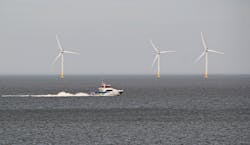Report suggests surge in UK offshore oil and gas, renewable energy spend
Offshore staff
LONDON – Britain’s offshore energy producers could spend up to £250 billion ($314 billion) on new energy projects in the North Sea and other UK waters between now and 2030, according to industry association Offshore Energies UK (OEUK).
Its research suggests around 60% will go towards new renewable and low carbon energy infrastructure, such as offshore wind and systems for capturing and storing CO2 in subsurface rock formations.
This week bp announced plans to invest up to £18 billion ($22.6 billion) in the UK’s energy system by the end of 2030.
OEUK says oil and gas companies transitioning to other types of energy will account for the larger investments, mainly offshore wind:
* £70 billion-plus ($87.9 billion) in capital investment, adding 40 GW of capacity to the 10GW already in place
* £20 billion ($25.1 billion) in opex – maintaining and operating wind farm infrastructure
* Investment in people: Building skills to construct and maintaining the offshore infrastructure.
In addition, OEUK anticipates £20 billion of investments in mass hydrogen production and carbon capture transport and storage plants
Planned spend on offshore oil and gas includes:
* £25 billion ($31.4 billion) to develop new oil and gas fields or grow existing resources
* £50 billion ($62.8 billion) to maintain or improve existing, often ageing infrastructure
* £15 billion ($18.8 billion) to decommission infrastructure.
At the same time, the association estimates the UK offshore sector is paying £20 million/day ($25.1 million) in taxes, more than double the sum paid a year ago when oil and gas prices were lower.
Ross Dornan, OEUK’s market intelligence manager, said: “We must invest in our existing oil and gas reserves to protect the UK against the global prices spikes and possible shortages generated by crises like Russia’s invasion of Ukraine, while also spending billions on the energies of the future.
“The amounts being spent are far greater than any sums that might be raised by a windfall tax but what policymakers need to understand is the sheer scale, not just of the investments but also of the ambition. The UK could become a world leader in low-carbon and renewable energy – but to achieve that we need long-term thinking by planners and policymakers.
“Above all we need a stable and predictable set of rules governing the way the industry is taxed and regulated. If those rules keep changing it will undermine confidence, drive investors away and make the UK’s net zero targets impossible to achieve.”
05.05.2022
